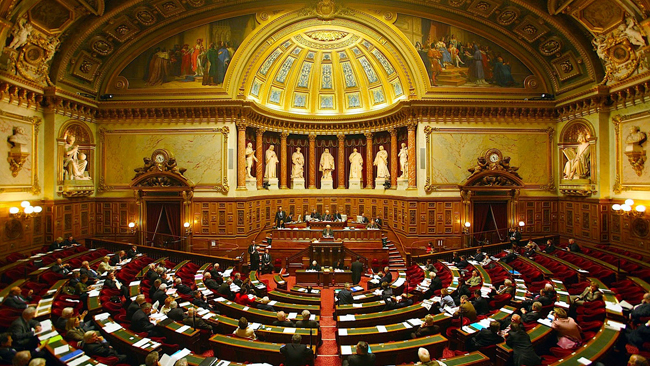“This is a shameful resolution”
An expert on the French Senate’s call to gradually lift sanctions against Russia
Last week the French Senate resolved to call on the government to lift – gradually and step by step – sanctions against Russia. This document, which is not binding but advisory, was voted in by 302 out of 318 Senate members, with 16 voting against.
This resolution was moved by the Republican Yves Pozzo di Borgo (UDI-UA faction) and the Simon Sutour (Socialist Party). According to di Borgo, the EU-level restrictive measures proved ineffective, for they only resulted in hindering the dialog with Russia. Meanwhile, Sutour also called for resuming a dialog with Russian parliament members and canceling the ban on their entry to the EU.
Secretary of State for European Affairs Harlem Desir, who represented the French government, tried in his speech to persuade Senators that this resolution was unconstructive. “The Minsk Agreements and sanctions made it possible to stop the hot phase of the conflict in eastern Ukraine. Therefore, sanctions are an effective lever of pressure on Russia,” Desir said.
It will be recalled that the National Assembly, the lower chamber of the French parliament, passed a similar resolution in April, in which MPs, incidentally, expressed a wish that France comes out against the extension of EU sanctions against Russia and urged their country’s government to start negotiations in order to lift these sanctions as soon as possible.
As we were going to press, there was no official reaction of Kyiv to this resolution. Speaking to journalists, Verkhovna Rada Speaker Andrii Parubii expressed a hope that the French government would “make a proper decision and support the sanctions because it is now one of the most important issues that unite the EU.”
Nicolas TENZER, chairman of the Center for Study and Research on Political Decision (CERAP):
“I will be outspoken: this resolution is shameful and understandable neither from a strategic nor an ethical point of view. Even if softer than National Assembly’s resolution passed two months ago, it will tarnish France’s image abroad and give a blank check to Putin’s aggressive behavior. Already the Russian media take profit of this resolution and other appeasers’ stances in Germany and Italy, without mentioning Greece and Hungary, to divide European member states and also the political ruling class within each of them. They must we aware than Ukraine’s fate will be pivotal for Europe’s destiny. That’s all about security and liberal values that are intertwined.
“This resolution, which is however non-binding, could be only explained through Russia’s influence towards some French MPs and government’s mismanagement of this issue. Instead of opposing the resolution and to gather the like-minded people who want to counter Putin’s policy, it tried to soften it and to make it more acceptable. It explains why only 16 senators oppose it – and only one from Socialist Party. Most of them didn’t assess what the disastrous consequences abroad would be. It was a true mistake, since the damages will be hard to repair.
“My own stance, quite often stated, is that the sanctions must remain and even be reinforced as far as Russia’s troops are in Donbas and Moscow doesn’t give back Crimea to Ukraine according to the international law. No country must be allowed to show disrespect for international treaties by invading other countries, to violate their own pledges, namely the Budapest Memorandum, and also to commit crackdown on human rights as Russia does in Crimea and in occupied territories in Donbas. We also know that Russia is overwhelmingly responsible for the non-implementation of Minsk agreement and that the Ukrainian casualties tragically increase in the last months. The disregard to those basic facts is shameful and was recalled by some senators who bravely opposed the resolution.”
What reaction can we expect from France’s president and government who are directly involved in Minsk process?
“This is now the main issue. Let’s remind that President Hollande always had strong stances against Russia’s behavior. He unquestionably is favoring the remaining of sanctions until Russia fully complies with Minsk agreement. A few weeks ago, the G7’s statement reaffirmed the necessity of those sanctions to be extended and even expanded if Russia does not abide by international law. As I said, according to French law, a parliamentary resolution is a non-binding document. I am expecting President Hollande’s clear statement in the weeks to come.
“Now the priority for French government is at first to reassure its allies, both in Europe and in America, and to officially state that it has no intention of lifting the sanctions against Russia. Second, he has to engage with France’s allies, including Ukraine, in order to better communicate on those critical issues and to better understand their own perceptions. Thirdly, it has to be outspoken too while discussing with Moscow. There are red lines and France’s and EU’s countries must stand by them. It seems that the European Council in June will extend the sanctions, and it will have to confirm them in fall and winter Councils if Russia doesn’t comply with Minsk agreements. Fourthly, it should as well better explain to the French people and their representatives its policy in this part of the world. It’s not really central in the domestic political debate, and it should be now.”
Why don’t French senators invite Ukrainian representatives to hear their opinion?
“I really don’t know, but it is not fair. We have to admit that Russia is more skilful in dealing with influence diplomacy. As I already advocate, Ukraine has to strengthen it in both European and each member state’s levels.”
Newspaper output №:
№38, (2016)Section
Topic of the Day





